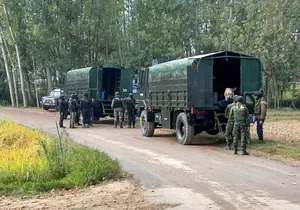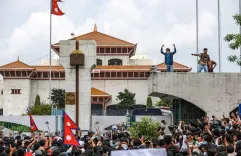What Happened in Kulgam? Two Terrorists and Two Soldiers Killed in Anti-Terrorist Operation

Synopsis
Key Takeaways
- Two soldiers and two terrorists were killed in an operation in Kulgam.
- Joint forces have intensified anti-terror operations.
- The role of drug smuggling in funding terrorism is under scrutiny.
- Advanced technology is being utilized to combat drone threats.
- The operation reflects ongoing security challenges in Jammu and Kashmir.
Srinagar, Sep 8 (NationPress) In a significant anti-terrorist operation conducted by joint security forces in J&K’s Kulgam district on Monday, two terrorists and two soldiers lost their lives, according to official reports.
The operation commenced with a gunfight in the Gudar forest area, where one terrorist was eliminated during the initial exchange of fire. Three soldiers, including a junior commissioned officer (JCO), sustained injuries.
The injured personnel were promptly transported to a medical facility, where unfortunately, two soldiers succumbed to their injuries, while the JCO's condition has been reported as stable.
As the operation continued, another terrorist was also neutralized.
In a statement on X, the Army’s Srinagar-based Chinar Corps expressed: "OP GUDDAR, Kulgam Chinar Corps honors the supreme sacrifice of our Bravehearts, Sub Perbhat Gaur and L/Nk Narender Sindhu, for their commitment to the Nation. Their courage and dedication will serve as an everlasting inspiration. #IndianArmy conveys heartfelt condolences and stands united with the grieving families."
"The operation is ongoing."
The identities of the deceased terrorists are currently under investigation. A gunfight erupted as joint security forces initiated a Cordon and Search Operation (CASO) in the Gudar forest area, based on intelligence regarding the terrorists' presence.
According to an official, "As the joint forces advanced, the terrorists opened fire, leading to an encounter."
Joint security forces have intensified their anti-terrorism initiatives in J&K, targeting terrorists, their overground workers (OGWs), and sympathizers.
Authorities emphasize that dismantling the terror ecosystem in the Union Territory requires addressing not only the armed terrorists but also their supporters.
Following the suspension of 'Operation Sindoor', there have been renewed attempts by terrorists to infiltrate into J&K from the Pakistani side of the Line of Control (LoC). The LoC stretches over 740 kilometers and is under constant Army surveillance. Additionally, there is a nearly 240-km-long International Border in Jammu, Samba, and Kathua districts that is also monitored by the BSF.
In collaboration with Pakistan, terrorist groups have been utilizing drones, particularly along the International Border, to transport weapons, drugs, and cash to the Indian territory.
The BSF is employing advanced anti-drone technology to thwart the actions of those directing terrorism from Pakistan.
Drug traffickers and peddlers are also being closely monitored, as it is believed that proceeds from drug smuggling and hawala operations are used to fund terrorism.
In many cases, the origins of drug trafficking and hawala networks have been traced back to Pakistan, where the masterminds of these terror operatives are based.





